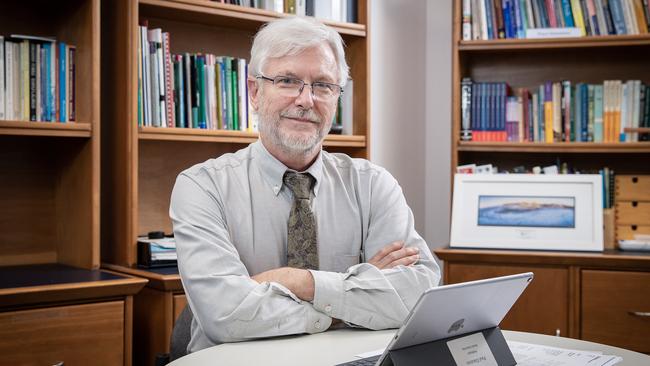Bond Uni’s Paul Glasziou is the top researcher in epidemiology
The speed of research into Covid-19 led to some problems, but overall it saved thousands of lives says Paul Glasziou.

Among the challenges the Covid-19 outbreak presented to researchers was the need to get studies about it done quickly: its spread, characteristics, treatment and prevention were all top priorities.
From the perspective of clinical epidemiologist and Bond University director of the Institute for Evidence-Based Healthcare, Paul Glasziou, speed bred poor practices.
“A problem with the whole pandemic [was] very poor quality of research and very poor quality of reporting,” says Glasziou, who The Australian’s 2021 Research magazine names as top researcher in epidemiology.
While his research mainly focuses on what he calls “big neglected problems – like antibiotic resistance and antibiotic stewardship, non-drug therapies and overtreatment and overdiagnosis”, research wastage is another major field of study,
Glasziou collaborated on one of the first reviews of the critical question of how many people who contracted Covid-19 were asymptomatic.
“There was a lot of worry about people having no symptoms but being able to transmit the virus. And a lot of the papers that were published on that were flawed,” he says.
The chief difficulty was the failure to follow subjects for long enough to produce valid results.
“Well-designed studies told us a reasonably true estimate of that asymptomatic rate, which turned out to be around about 17 per cent when you averaged across all of the good quality studies,” Glasziou says.
That very influential 2020 paper was picked up by the World Health Organisation, via review team member and UNSW epidemiologist Mary-Louise McLaws, who is also a member of two hugely important WHO committees dealing with its response to Covid-19 and development of guidance in relation to it.
While good work “saved hundreds of thousands of lives in the pandemic”, Glasziou argues much of it arose from a level of preparedness among scientists who had experienced previous pandemics.
An example was the Coalition for Epidemic Preparedness Innovations (CEPI), launched at the World Economic Forum at Davos, Switzerland, in 2017 to develop vaccines to stop future epidemics. Among the Covid-19 vaccine trials it invested in are Moderna, the (abandoned) University of Queensland vaccine, and AstraZeneca.
“It wasn’t a standing start,” Glasziou says. “The funding was already allocated, the protocols were designed. The whole system was ready to go, just waiting … to start the clock as soon as a pandemic was called.”
It is a good news story amid a frustrating fight against the virus, most recently its Delta variant.
Challenges such as the coronavirus compound the urgency of making each piece of research count, something Glasziou and others have been pushing for decades.
One highly cited paper was co-written with colleague Iain Chalmers in 2009.
“We calculated that about 85 per cent of research goes to waste because of non publication, poor reporting or avoidable serious flaws in the design of the research,” Glasziou says.
He argues that funders of research can play an important role in solving the problem, by building into the research infrastructure an insistence on conditions such as quality and proper reporting.
The Ensuring Value in Research Funders’ Forum (EViR), established in 2017, grew out of that work.
“It involves about 40 funders from around the world who are working out ways to address the 85 per cent waste,” he says.
It was a huge vindication, “the fact that EViR meets twice a year, basically using the framework that we set out 12 years ago for analysing how to deal with the problems and what the solutions might be and working them up”.
-




To join the conversation, please log in. Don't have an account? Register
Join the conversation, you are commenting as Logout